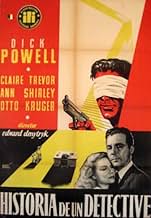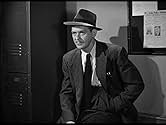After being hired to find an ex-con's former girlfriend, Philip Marlowe is drawn into a deeply complex web of mystery and deceit.After being hired to find an ex-con's former girlfriend, Philip Marlowe is drawn into a deeply complex web of mystery and deceit.After being hired to find an ex-con's former girlfriend, Philip Marlowe is drawn into a deeply complex web of mystery and deceit.
- Awards
- 1 win
Donald Douglas
- Police Lt. Randall
- (as Don Douglas)
Ernie Adams
- Bartender at 'Florian's'
- (uncredited)
Bernice Ahi
- Dancer at the 'Cocoanut Beach Club'
- (uncredited)
George Anderson
- Detective
- (uncredited)
Edward Biby
- Club Patron
- (uncredited)
Jack Carr
- Dr. Sonderborg's Assistant
- (uncredited)
Tom Coleman
- Police Clerk
- (uncredited)
Ralph Dunn
- Detective
- (uncredited)
Sam Finn
- Headwaiter
- (uncredited)
- Director
- Writers
- All cast & crew
- Production, box office & more at IMDbPro
Storyline
Did you know
- TriviaFor the scene in which Marlowe is drugged, Edward Dmytryk showed Dick Powell falling through a sea of faces. He borrowed a trick from Saboteur (1942) by having the camera pull back from the actor to make it seem like he was falling. He also had the camera accelerate as it pulled back, to intensify the horror.
- GoofsWhen Marlowe leaves the car to look for the person for the payoff, he draws his gun from his left pocket with his left hand and then replaces it in his left pocket. After he is sapped and wakes up, he draws it from his right pocket with his right hand. Later, when the police interrogation ends, he cleans up and he has an empty shoulder holster on his left shoulder and then puts his pistol in the holster as he leaves.
- Quotes
Philip Marlowe: She was a charming middle-aged lady with a face like a bucket of mud. I gave her a drink. She was a gal who'd take a drink, if she had to knock you down to get the bottle.
- Alternate versionsExists in color-computerized version.
- ConnectionsEdited into American Cinema: Film Noir (1995)
Featured review
Phillip Marlowe is tired and resting in his office when Moose Malloy comes to visit him and hire him as a private detective to investigate his former lover, Velma, who has gone missing in the past 8 years that Moose has been in jail. Without a great deal of luck early on, Marlowe takes another case, escorting a Mr Marriott. When Marlowe is knocked out and Marriott murdered, things begin to get more confusing. With the police suspecting him of being involved more than he is letting on, Marlowe investigates further, getting involved in other jobs for clients who want to find Moose Malloy for some reason. Murder follows murder as Marlowe finds himself right in the middle of it with only his link to Moose keeping him alive.
Having recently seen a strange telling of this story in 'The Falcon Takes Over' I decided to go back and see the most famous version. Of course this actually involves going forward in time (the Falcon did it first by almost two years) but it is certainly a step up in quality as this version is much, much better since in the first version it was used as plot fodder within an existing formula. I have not read the book but for me everything works really well here with the right mix of plot, character and atmosphere. As I have admitted before, I'm not the smartest of men on this earth and, as a result, I do get confused by some of this type of film where the twisty plot is not that well explained (The Big Sleep always has me a bit spun) and here at times I was a bit unsure of who was what, but this comes good by the end and is clear with a satisfying ending to the piece. The atmosphere is tough considering the period and is more effective for being built tough on the characters and not by just writing lots of F words into the script. Dmytryk directs really well with the time honoured shadow and use of music, the camera also moves well even if some of the shots look a bit dated (well it has been sixty years this year you know).
The characters are well-written and convincing. Marlowe is a dead beat cool but not so tough and together that it takes away from his status as being a downbeat. Powell is not someone who leaps to mind when I think about the noir genre but he is very good here and gets the character really spot on. Mazurki makes Malloy his own with a firm performance that shows Moose to be strong but also manipulated by the love he totally believes in. Trevor is very good, as are Shirley and Kruger. The dialogue is sharp and tough and all of them do really well with the lines and the characters they have (making them more than pigeon-holed genre clichés) but the film mostly belongs to Powell.
Overall this is a very good film and is miles better than the first filmed version of this story. The film is atmospheric and looks great; the story is not afraid to risk losing the audience and is smart but pulls it all together and didn't lose me totally at any point. The dialogue is tough and quotable and is delivered by a collection of actors giving good performances, headed up by Dick Powell, doing his best to make us think of him first when we think of this story and the character of Marlowe.
Having recently seen a strange telling of this story in 'The Falcon Takes Over' I decided to go back and see the most famous version. Of course this actually involves going forward in time (the Falcon did it first by almost two years) but it is certainly a step up in quality as this version is much, much better since in the first version it was used as plot fodder within an existing formula. I have not read the book but for me everything works really well here with the right mix of plot, character and atmosphere. As I have admitted before, I'm not the smartest of men on this earth and, as a result, I do get confused by some of this type of film where the twisty plot is not that well explained (The Big Sleep always has me a bit spun) and here at times I was a bit unsure of who was what, but this comes good by the end and is clear with a satisfying ending to the piece. The atmosphere is tough considering the period and is more effective for being built tough on the characters and not by just writing lots of F words into the script. Dmytryk directs really well with the time honoured shadow and use of music, the camera also moves well even if some of the shots look a bit dated (well it has been sixty years this year you know).
The characters are well-written and convincing. Marlowe is a dead beat cool but not so tough and together that it takes away from his status as being a downbeat. Powell is not someone who leaps to mind when I think about the noir genre but he is very good here and gets the character really spot on. Mazurki makes Malloy his own with a firm performance that shows Moose to be strong but also manipulated by the love he totally believes in. Trevor is very good, as are Shirley and Kruger. The dialogue is sharp and tough and all of them do really well with the lines and the characters they have (making them more than pigeon-holed genre clichés) but the film mostly belongs to Powell.
Overall this is a very good film and is miles better than the first filmed version of this story. The film is atmospheric and looks great; the story is not afraid to risk losing the audience and is smart but pulls it all together and didn't lose me totally at any point. The dialogue is tough and quotable and is delivered by a collection of actors giving good performances, headed up by Dick Powell, doing his best to make us think of him first when we think of this story and the character of Marlowe.
- bob the moo
- Dec 3, 2004
- Permalink
Details
- Release date
- Country of origin
- Language
- Also known as
- Farewell, My Lovely
- Filming locations
- Sunset Tower Hotel - 8358 Sunset Blvd, West Hollywood, California, USA(apartment of Jules Amthor)
- Production company
- See more company credits at IMDbPro
Box office
- Budget
- $400,000 (estimated)
- Runtime1 hour 35 minutes
- Color
- Aspect ratio
- 1.37 : 1
Contribute to this page
Suggest an edit or add missing content




































